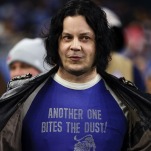Jim and Bob Burgess are dragged back to their Maine hometown after their nephew, Zach, throws a pig’s head into a local mosque. Faced with Zach’s upcoming legal battle and the fragility of their sister, Susan, the brothers begin to examine their past and their relationships with each other. The family dynamic, with Jim as the older brother and golden boy, begins to collapse as secrets are revealed and Zach’s trial goes on.
But a quick plot synopsis misses a key aspect of the novel: the ripples the brothers create throughout the lives of those around them. The Burgess Boys assembles a large cast of characters, made up of ex-wives, future spouses, co-workers, and those affected by Zach’s incident. Although many of these people’s connections to the Burgesses are long past, their memories of Jim, Bob, and Susan stay with them, coming to mind in unexpected moments. Through her many characters, Strout shows how one nuclear family can expand and incorporate those around them.
For a book centered on family life, with few plot twists, The Burgess Boys is a surprising page-turner. Strout imbues the Burgess’ domestic life with a vitality that feels propulsive, turning what might be a quiet, contemplative novel into an exhilaratingly quick read. At times, the prose is a bit too quirky for its own good, but for the most part, Strout’s style is strong enough that she can render her characters vividly without spending too much time on poetic description. She smartly focuses on each member of her cast for just a few pages before switching perspectives. This gives her a broad array of voices to flesh out her world, but also allows her characters to be defined in many different ways, as in real life.
The Burgess boys are meant to be charismatic toward the other characters in the book, but Strout manages to make them engaging for readers as well. It’s rare for a novel to have characters who are normal in so many ways, yet still so empathetic. Bob’s quiet movement through life is typical for many middle-aged divorced men, and Jim is a corporate lawyer right out of a John Grisham book. Yet The Burgess Boys makes them tender and unique. Their conflicts and troubles are quotidian, but come across with tremendous force because Jim and Bob are so appealing.
The Burgess Boys is a reminder that commonplace events are still pregnant with importance. Zachary’s incident with the pig head is shocking, but ultimately a standard rebellion for a small-town teen with few friends and parental issues. His acting out, like all the problems facing the Burgesses, is pretty typical for a WASPy American family. Strout isn’t interested in romanticizing the everyday; she wants to reveal that things people take for granted as part of our lives (divorce, teenage rebellion, parental death) are more traumatic than they realize. Boys manages to make small happenings big without blowing them out of proportion, a noble feat too few books even attempt.






![Rob Reiner's son booked for murder amid homicide investigation [Updated]](https://img.pastemagazine.com/wp-content/avuploads/2025/12/15131025/MixCollage-15-Dec-2025-01-10-PM-9121.jpg)

























![HBO teases new Euphoria, Larry David, and much more in 2026 sizzle reel [Updated]](https://img.pastemagazine.com/wp-content/avuploads/2025/12/12100344/MixCollage-12-Dec-2025-09-56-AM-9137.jpg)








